yuchenssr_symbolica_mcp
by YuChenSSRSymbolica MCP Server for Scientific Computing
Overview
The Symbolica MCP Server is a powerful tool designed for scientific computing, enabling AI systems like Claude to perform symbolic computations, mathematical calculations, data analysis, and visualizations. It is particularly useful for applications in quantum computing, engineering, and scientific research, all within a containerized environment.
Features
- Scientific Computing Operations: Run operations with NumPy, SciPy, SymPy, and Pandas.
- Symbolic Mathematics: Solve differential equations and perform symbolic computations.
- Linear Algebra: Support for matrix manipulations and linear algebra operations.
- Quantum Computing: Analyze quantum computing problems.
- Data Visualization: Create visualizations with Matplotlib and Seaborn.
- Machine Learning: Perform operations with scikit-learn.
- Tensor Operations: Execute complex matrix and tensor calculations.
- Cross-Platform Support: Automatically detects and supports Windows, macOS, and Linux, including Mac M series chips.
- Processor Compatibility: Works on both Intel/AMD (x86_64) and ARM processors.
Quick Start
Using the Docker Image
# Pull the image from Docker Hub
docker pull ychen94/computing-mcp:latest
# Run the container (automatically detects host OS)
docker run -i --rm -v /tmp:/app/shared ychen94/computing-mcp:latest
For Windows users:
docker run -i --rm -v $env:TEMP:/app/shared ychen94/computing-mcp:latest
Integrating with Claude for Desktop
- Open Claude for Desktop.
- Navigate to Settings ➝ Developer ➝ Edit Config.
- Add the following configuration:
For MacOS/Linux:
{
"mcpServers": {
"computing-mcp": {
"command": "docker",
"args": [
"run",
"-i",
"--rm",
"-v",
"/tmp:/app/shared",
"ychen94/computing-mcp:latest"
]
}
}
}
For Windows:
{
"mcpServers": {
"computing-mcp": {
"command": "docker",
"args": [
"run",
"-i",
"--rm",
"-v",
"%TEMP%:/app/shared",
"ychen94/computing-mcp:latest"
]
}
}
}
Examples
Tensor Products
import numpy as np
import matplotlib.pyplot as plt
# Define two matrices
A = np.array([[1, 2], [3, 4]])
B = np.array([[5, 6], [7, 8]])
# Calculate tensor product using np.kron (Kronecker product)
tensor_product = np.kron(A, B)
# Display the result
print("Matrix A:")
print(A)
print("\nMatrix B:")
print(B)
print("\nTensor Product A ⊗ B:")
print(tensor_product)
# Create a visualization of the tensor product
plt.figure(figsize=(8, 6))
plt.imshow(tensor_product, cmap='viridis')
plt.colorbar(label='Value')
plt.title('Visualization of Tensor Product A ⊗ B')
plt.show()
Symbolic Mathematics
import sympy as sp
import matplotlib.pyplot as plt
import numpy as np
# Define symbolic variable
x = sp.Symbol('x')
y = sp.Function('y')(x)
# Define the differential equation: y''(x) + 2*y'(x) + y(x) = 0
diff_eq = sp.Eq(sp.diff(y, x, 2) + 2*sp.diff(y, x) + y, 0)
# Solve the equation
solution = sp.dsolve(diff_eq)
print("Solution:")
print(solution)
# Plot a particular solution (C1=1, C2=0)
solution_func = solution.rhs.subs({sp.symbols('C1'): 1, sp.symbols('C2'): 0})
print("Particular solution:")
print(solution_func)
# Create a numerical function we can evaluate
solution_lambda = sp.lambdify(x, solution_func)
# Plot the solution
x_vals = np.linspace(0, 5, 100)
y_vals = [float(solution_lambda(x_val)) for x_val in x_vals]
plt.figure(figsize=(10, 6))
plt.plot(x_vals, y_vals)
plt.grid(True)
plt.title("Solution to y''(x) + 2*y'(x) + y(x) = 0")
plt.xlabel('x')
plt.ylabel('y(x)')
plt.show()
Data Analysis
import numpy as np
import pandas as pd
import matplotlib.pyplot as plt
from sklearn.cluster import KMeans
from sklearn.preprocessing import StandardScaler
# Create a sample dataset
np.random.seed(42)
n_samples = 300
# Create three clusters
cluster1 = np.random.normal(loc=[2, 2], scale=0.5, size=(n_samples//3, 2))
cluster2 = np.random.normal(loc=[7, 7], scale=0.5, size=(n_samples//3, 2))
cluster3 = np.random.normal(loc=[2, 7], scale=0.5, size=(n_samples//3, 2))
# Combine clusters
X = np.vstack([cluster1, cluster2, cluster3])
# Create DataFrame
df = pd.DataFrame(X, columns=['Feature1', 'Feature2'])
print(df.head())
# Standardize data
scaler = StandardScaler()
X_scaled = scaler.fit_transform(X)
# Apply KMeans clustering
kmeans = KMeans(n_clusters=3, random_state=42)
df['Cluster'] = kmeans.fit_predict(X_scaled)
# Plot the clusters
plt.figure(figsize=(10, 6))
for cluster_id in range(3):
cluster_data = df[df['Cluster'] == cluster_id]
plt.scatter(cluster_data['Feature1'], cluster_data['Feature2'],
label=f'Cluster {cluster_id}', alpha=0.7)
# Plot cluster centers
centers = scaler.inverse_transform(kmeans.cluster_centers_)
plt.scatter(centers[:, 0], centers[:, 1], s=200, c='red', marker='X', label='Centers')
plt.title('K-Means Clustering Results')
plt.xlabel('Feature 1')
plt.ylabel('Feature 2')
plt.legend()
plt.grid(True)
plt.show()
Quantum Computing
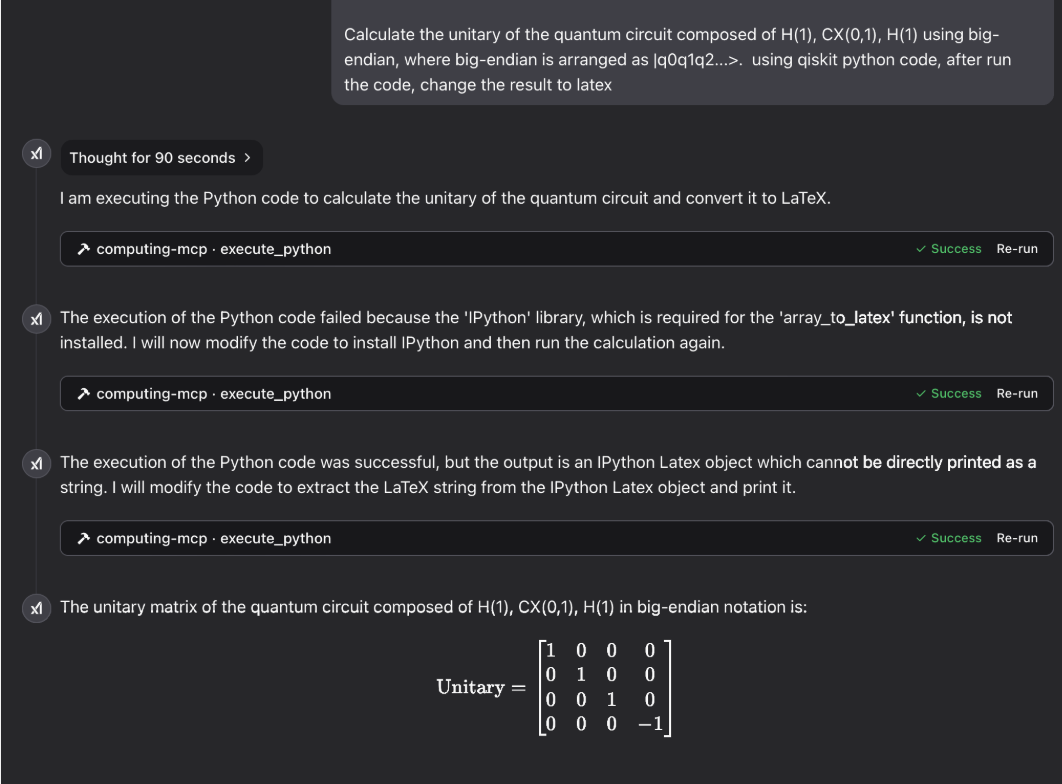
Gallery
- Laser Physics:
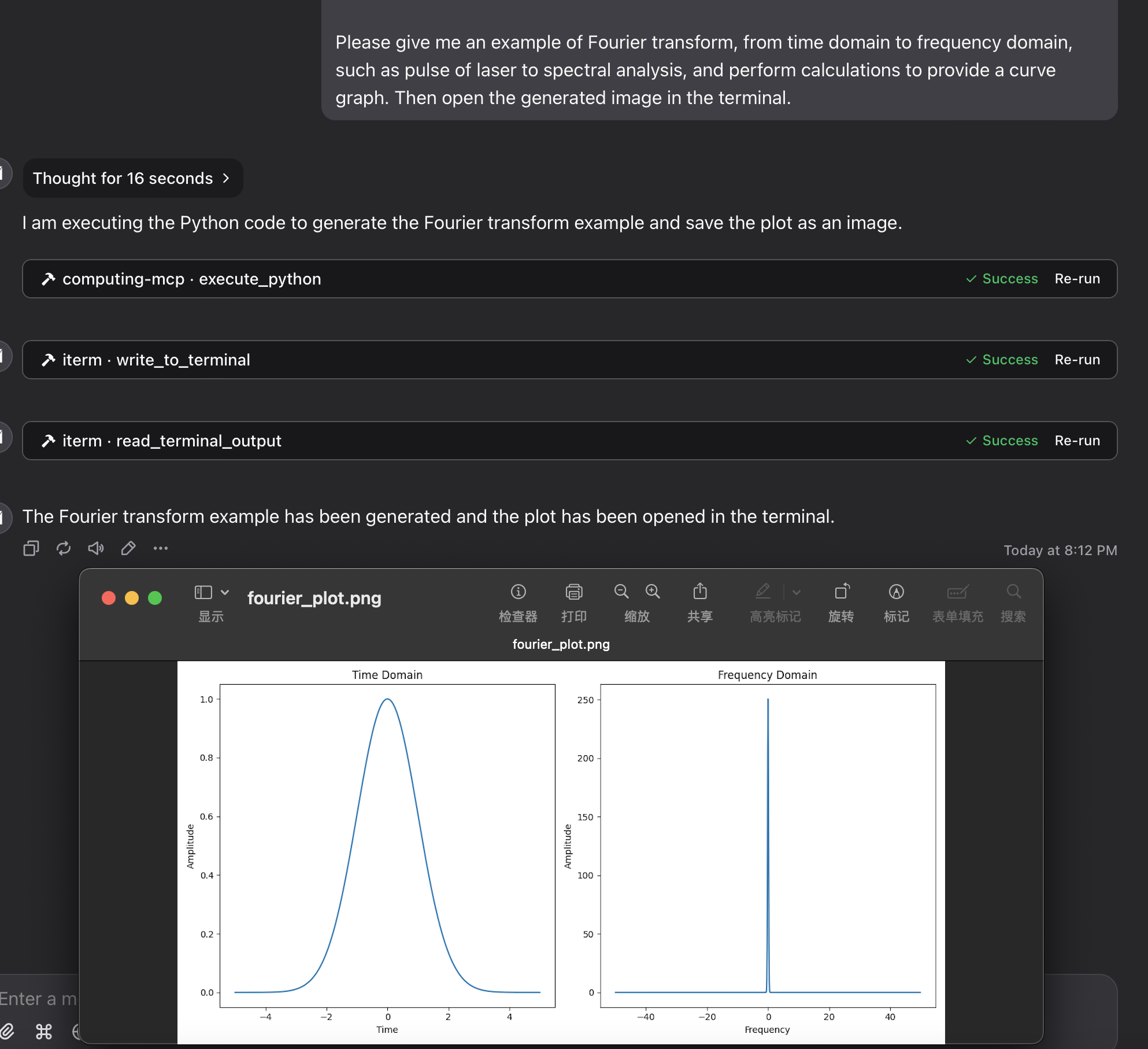
- Elliptic Integral:
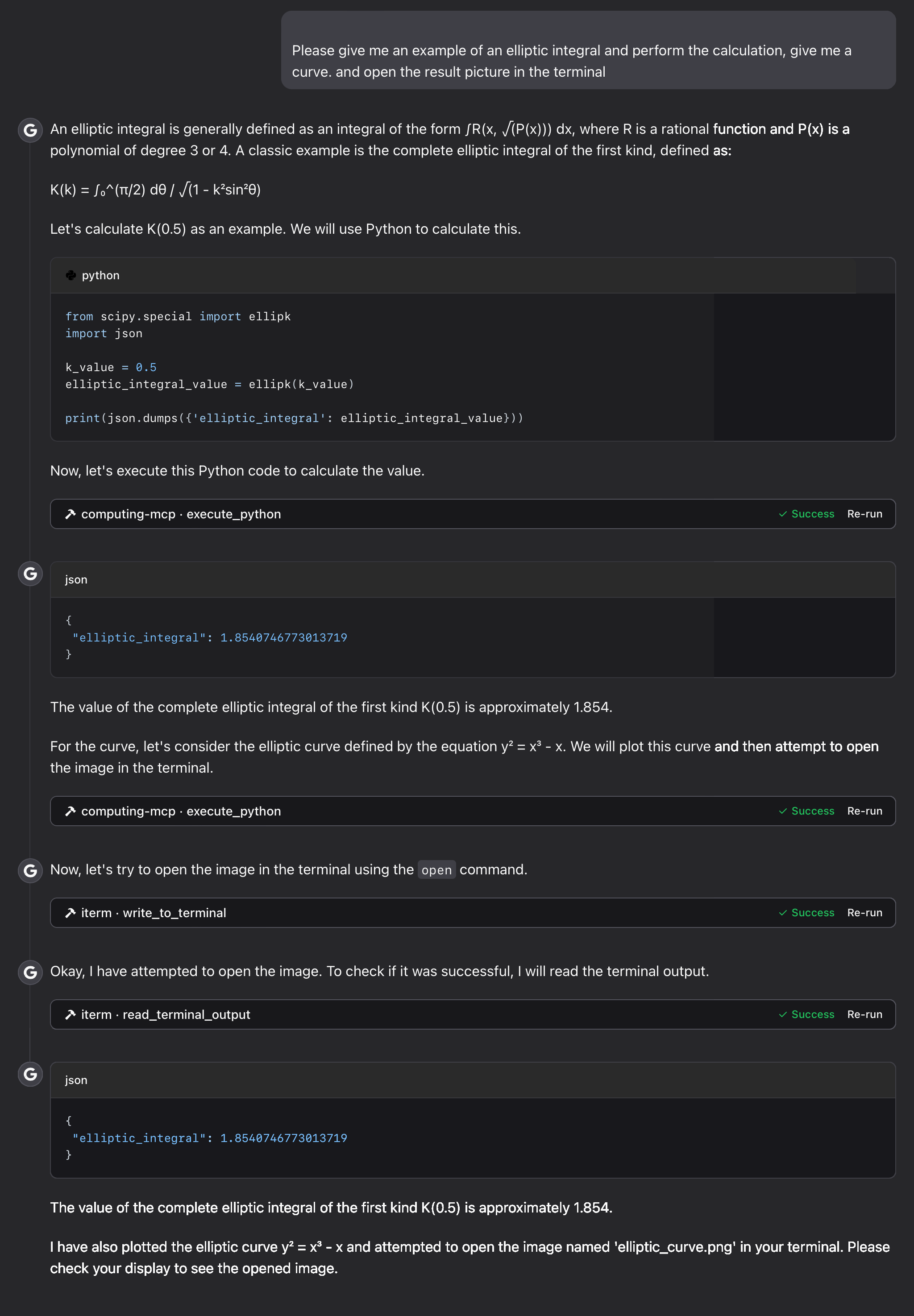
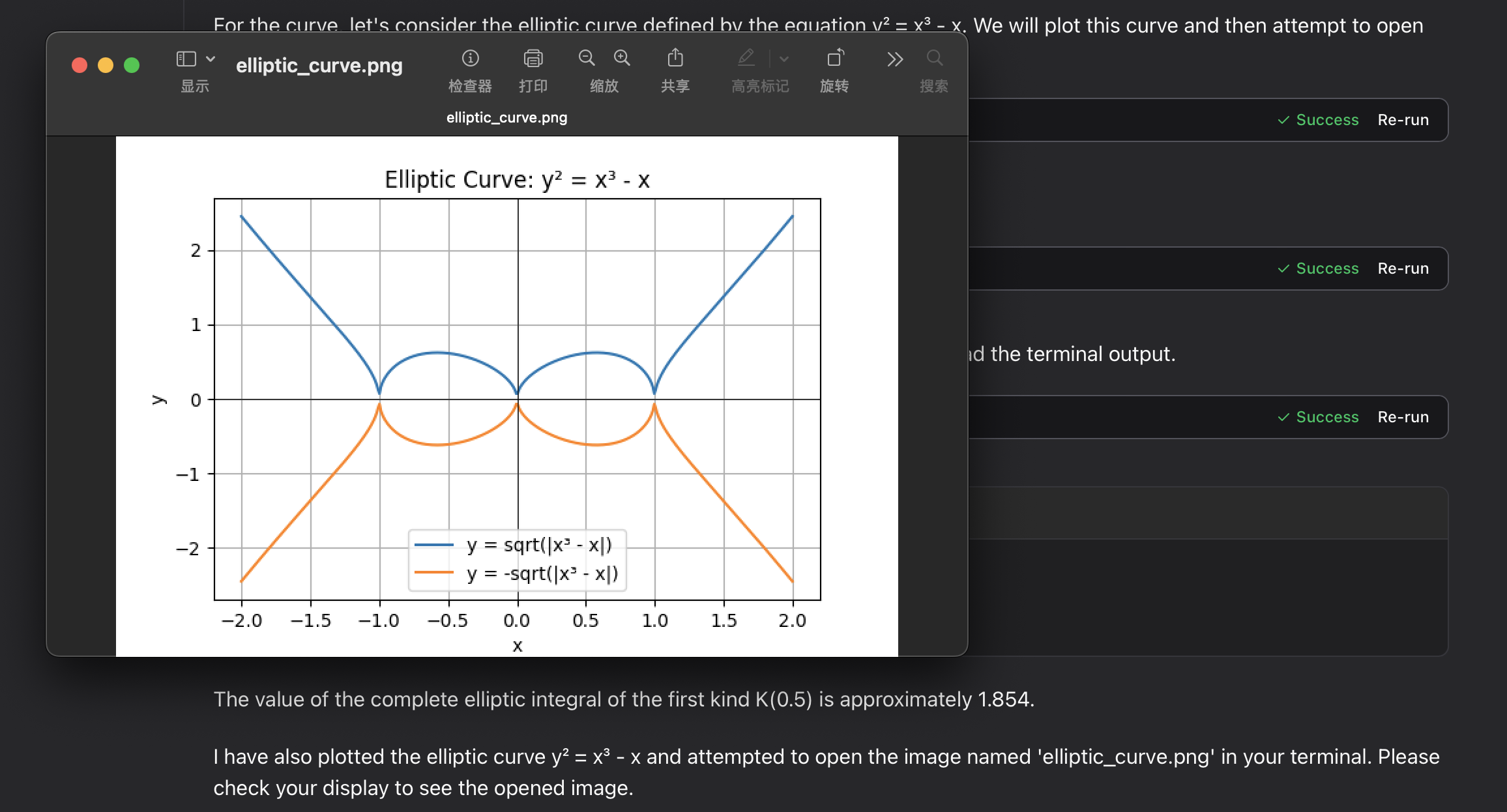
Troubleshooting
Common Issues
- Permission errors with volume mounts: Ensure the mount directory exists and has appropriate permissions.
- Plot picture files not appearing: Check the path in your host system (
/tmpfor macOS/Linux or your temp folder for Windows) and verify Docker has permissions to write to the mount location.
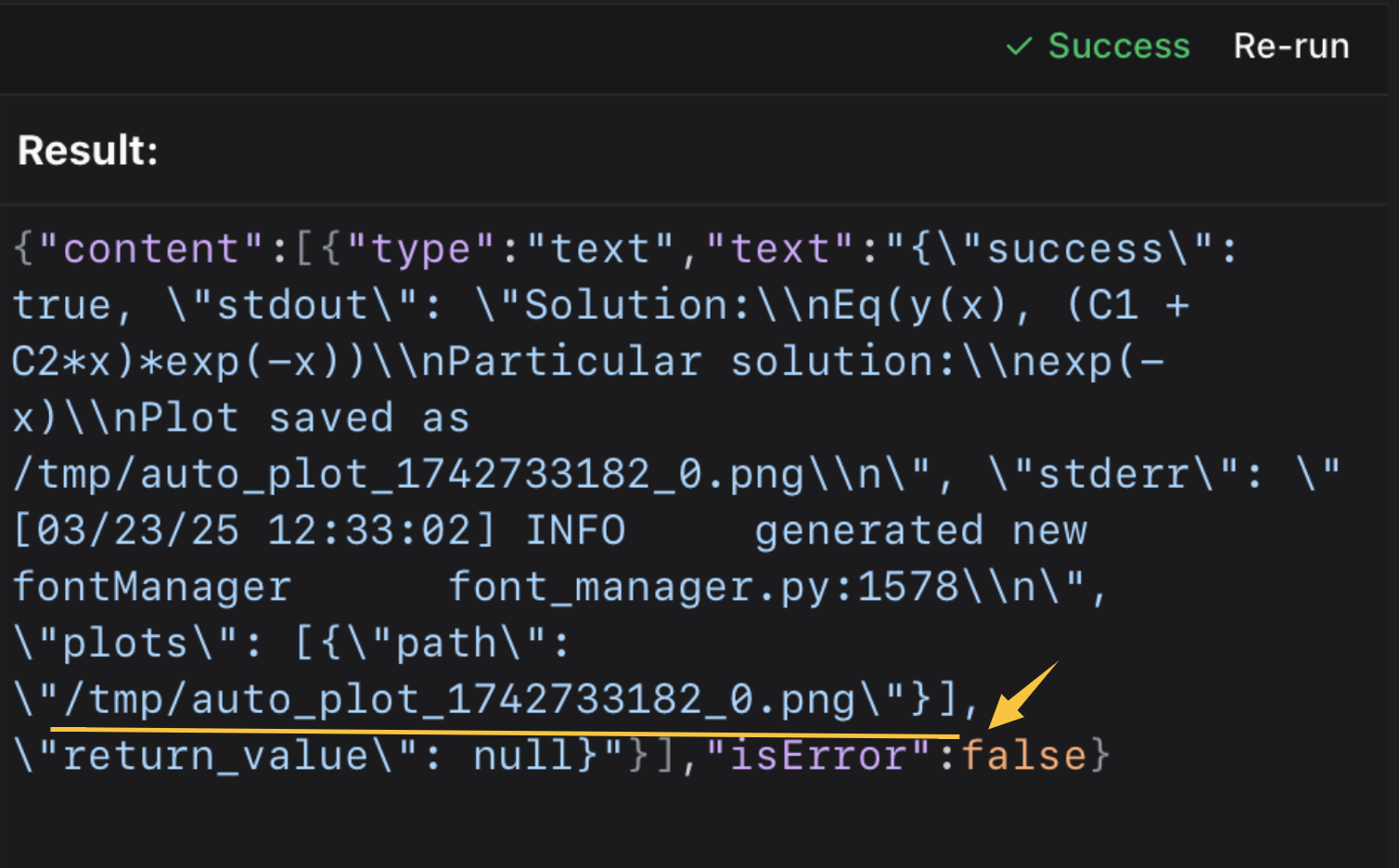
Support
If you encounter issues, please open a GitHub issue with:
1. Error messages
2. Your operating system and Docker version
3. Steps to reproduce the problem
License
This project is licensed under the MIT License. For more details, see the LICENSE file.
About
Symbolica MCP Server is designed for symbolic computation and mathematical calculations, especially in the field of quantum computing.
